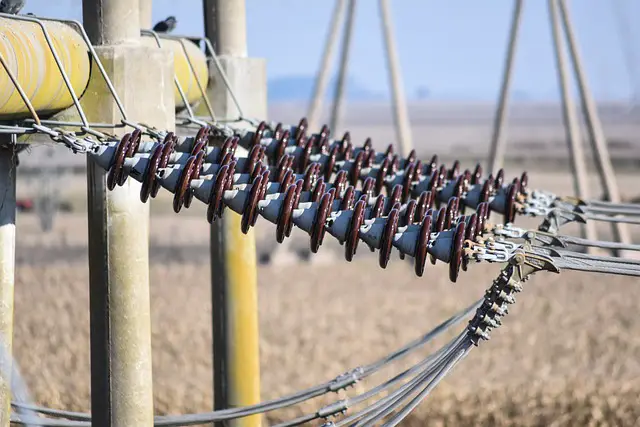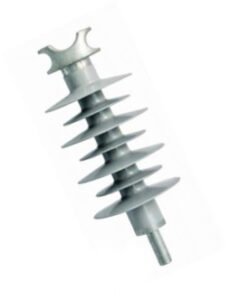Porcelain and Polymer Insulators
An insulator is a material or electrical device used to insulate electrical equipment and systems from each other to prevent electrical energy from flowing through unwanted paths. An insulator isolates the circuit and blocks the flow of current through them while still allowing to maintain mechanical contact between the conductive materials. Hence insulators are necessary to support the power lines or conductors through the poles or towers and still prevent electrical energy from escaping to the ground or other paths that potentially cause damage to equipment or harm to people and animals.
Porcelain Insulators
Electrical porcelain insulators are made from a type of ceramic material called porcelain. They are used in electrical power systems to insulate high-voltage power lines and equipment.

Porcelain insulators are typically made by molding a mixture of kaolin clay and feldspar at high temperatures. This mixture is then glazed to make it more resistant to weathering and pollution. Porcelain insulators are highly durable and can withstand extreme temperatures and weather conditions, as well as mechanical stress. Porcelain insulators are typically used in high-voltage applications, such as transmission and distribution systems, and are known for their durability and long service life.
Porcelain insulators come in a variety of shapes and sizes, depending on their intended use. For example, suspension insulators are used to suspend high-voltage power lines from towers, while pin insulators are used to attach power lines to poles. Porcelain insulators can also be used in transformers and other electrical equipment to provide insulation and protect against electrical faults.
One important thing to note is that the porcelain insulators must be clean and free of any contamination or damage to ensure their proper functioning. Pollution and bird droppings can cause electrical discharges and lead to power outages. Therefore, they need to be maintained and cleaned regularly, especially in areas with heavy pollution.
In summary, electrical porcelain insulators are made of ceramic material that is used to insulate high-voltage power lines and equipment. They are highly durable, non-conductive, and can withstand extreme temperatures and weather conditions. They come in various shapes and sizes depending on the application. Proper maintenance and cleaning are important for the proper functioning of porcelain insulators.
Polymer insulators
Electrical polymer insulators are devices that are used to insulate and protect electrical equipment from electrical and mechanical stresses. They are typically made of a polymer material, such as silicone or polyethylene, and are designed to withstand high temperatures, UV radiation, and other environmental factors.

Electrical polymer insulators are used in high-voltage electrical systems, such as transmission and distribution systems, power plants, and substations. They are also used in a variety of industrial applications, such as in oil and gas pipelines, wind turbines, and solar panels.
They are typically lighter and more flexible than porcelain insulators and can withstand high temperatures and UV radiation. They are also more resistant to moisture, dust, and other environmental factors. Polymer insulators are also more resistant to external stresses such as mechanical and thermal loads. They are typically used in lower voltage applications, such as distribution systems, and have a shorter service life compared to porcelain insulators.
They are designed to withstand harsh environmental conditions and provide long-lasting insulation, protecting both equipment and personnel from electrical hazards.
Comparison
Porcelain and polymer insulators are both commonly used in electrical systems, but they have different properties and characteristics that make them suitable for different applications.
In terms of cost, polymer insulators are generally less expensive than porcelain insulators, making them a more cost-effective solution for some applications. However, in some extreme conditions, such as high humidity or high pollution, porcelain insulators are considered more reliable than polymer insulators.
Polymer insulators are flexible and weigh less compared to porcelain, so polymer types are easy to install and maintain. Also due to its less weight the structure and support to install is also minimally required.
In conclusion, both porcelain and polymer insulators have their own advantages and disadvantages, and the choice of which to use depends on the specific application and environmental conditions.